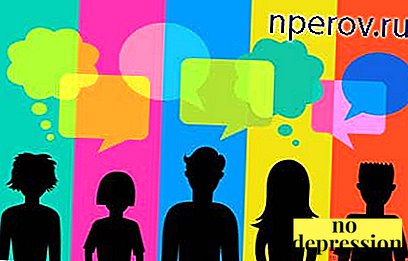Speaking of human needs, imply different types of needswhich are both conscious and unconscious.
They are the source of feelings, emotions, desires, aspirations and the catalyst of activity with the purpose of their satisfaction.
What it is?

What does “need” mean? Human survival depends on the availability of appropriate conditions and means.
If at a certain moment they are missing - this causes a state of need.
Ultimately, the human body begins to respond to irritating factors and to be active, since it is naturally programmed to save life and further survival.
The state of need leading to the activity of the subject is called need.
Not a single living creature on the planet There are not as many needs as people. To realize them, a person is forced to act actively, as a result of which he develops in different directions and cognizes the world around him.
Satisfying needs is accompanied by positive emotions, otherwise - negative ones.
Regardless of gender, nationality or position in society, everyone has needs. Some of their species appear at birth, others in the course of later life.
With age, the list of needs is changing. Among the primary include the need for air, water, food, sex. Secondary needs are directly related to psychology. These include the need for respect, success, recognition.
Classification

The issue of human needs has been studied by many scientists at different times. In this regard, there are many theories and interpretations that describe the relationship between needs, needs and the process of their satisfaction in different ways.
Main types of needs:
- Survival - the strongest instinct. In nature, each individual is inherent in the desire to save lives and protect their relatives and friends from danger.
If there is no guarantee of survival, all other needs go to the distant plan.
- Security. After the guarantee of survival is received, people begin to feel the need for security: financial - people are afraid of poverty and material losses, so they take actions aimed at overcoming them and increasing their income; physical - all people need housing, clothing and food; emotional - when an individual reaches the minimum safe level of security, he has a need for comfort.
- Free time. People tend to relax more, spend less time at work and take care of themselves.
- Respect. A senior position often stimulates people more than a large salary. Lack of respect from others can cause a deep sense of dissatisfaction.
- Love. A person has an urgent need to love and be loved. Therefore, people tend to create the favorable conditions necessary for the emergence and maintenance of this feeling.
- Self-realization. Man is in dire need of the realization of his creative and personal potential.
Therefore, throughout life, people try to demonstrate their abilities and achieve the maximum possible.

According to Simonov
In the scientific work of the psychologist P. V. Simonov the following classification of human needs is given:
- Vital needs. What does it mean? This includes the need for: water; food; night dream; protection against threats; desire to have offspring.
- Social needs. This includes the desire of a person to enjoy respect and love from society, to belong to one of the social groups and to occupy a worthy place in it. It is very important to follow the rules and regulations established in a particular community. Without compliance with this condition, the very existence of various groups would be impossible.
Describing social needs, Hegel pointed to the need of a human being for ideology and religion, which normalize the behavior of a biological unit in society.
- Ideal needs. Here we are talking about the need of the individual in the knowledge of the world, himself, in finding his own purpose and determining the place in life. This need motivates people to engage and be interested in art.

These needs are typical for people who are representatives of one of the species.
This paragraph also includes the need to save power, motivating to spend the minimum amount of energy to achieve a certain goal.
As a result, a person begins to show ingenuity, develop and improve technology.
In some cases, this approach may lead to the development of laziness.
The author has divided the social and vital needs into two additional categories:
- For others;
- for myself.

Ideal needs, which consist in the desire to know the truth, do not contain such a division.
Because the true meaning of things and processes implies their single form.
In the study of human needs in our time using an integrated approach and a full arsenal of scientific methods.
Not knowing the reliable reasons for the origin and formation of needs and the degree of their influence on brain activity, it is impossible to effectively solve the following tasks:
- prevention and treatment of mental disorders;
- prevention of asocial and inappropriate behavior;
- proper education.
The concept of hierarchy
The hierarchy of needs brought psychologist Abraham Maslow. Numerous needs and desires of people he put together in the form of a pyramid, which clearly demonstrated his scientific view of this problem. In the pyramid, Maslow placed the needs as they grow.
The scientist was convinced that as long as the individual is in dire need of primitive things, he does not think about the needs of a higher level. Maslow gave examples to prove his theory.
He argued that physiological needs are basic. A society in which everyone is full, and no one has even the slightest cause for alarm, the psychologist called perfect. A hungry man does not need love. However, lovers still need to eat regularly.
It is noteworthy that Maslow used the definition of satiety in a rather broad sense. By it, he meant not only the abundance of food, but also sleep, water, oxygen, sex. Below is a classification of human needs according to Maslow.
Congenital or primary
At the first level are the vital needs of people. These are the needs inherent in man as a living being. They include the need to meet the following needs:
- hunger;
- the need for breathing;
- thirst;
- relaxation;
- the need for housing, clothing;
- procreation;
- physical activity.

Maslow argued that the poor man is first and foremost in need of satisfaction baseline or biogenic (natural) needs. Choosing between respect and food, most people will prefer the latter option.
The second level comes from the individual’s need for security. It contains the following list of needs:
- safety of existence;
- stability of conditions;
- job security;
- comfort of existence;
- confidence in your future.
When a person is full and has no health problems, he begins to feel an urgent need for security. Such an individual strives for a rational order in life and predictability of their future.
Acquired or secondary
At the third level are social needs. By them are meant:
- care for members of society;
- attention to yourself;
- affection for loved ones;
- social connections;
- participation in joint projects.
After the primary needs satisfied, a person begins to feel the need for friendship, love and family relationships.
The individual begins to search for a social group, belonging to which could satisfy his desires and get rid of loneliness.
The fourth level is associated with prestigious needs people. These are needs that are satisfied by a person as a result of their activities. These include:
- respect from other members of the community;
- recognition by people around them;
- success in the professional field of activity;
- ability assessment;
- self esteem;
- movement up the service ladder.

Each member of society needs to recognize their abilities and talents from others. Person seeking self-esteem and begins to believe in his own strength when he achieves certain results in life.
Spiritual needs are on the fifth level. Here are:
- self-identification;
- self-expression;
- self-realization;
- self-affirmation;
- self development.
Maslow is convinced that the need for self-expression is manifested in a person only after all lower requirements are fully met.
In accordance with the theory of the scientist, the individual acts in strict accordance with the hierarchy given in the pyramid. Most people do it that way.
However, there are exceptions. There is a narrow group of individuals who put their ideals above everyday problems.
These include people of science and art, seeking to self-realization and development, despite the hardships and hunger. Usually such individuals exist personal needs hierarchyaccording to which they live.
Differences between lower and higher

What is the difference between higher and lower needs? Lower needs are associated with natural body needs.
The need for basic conditions for survival - food, air, water - is determined by nature itself.
How do the higher needs express themselves? Higher needs go far beyondnecessary for physical survival and support the functioning of the body.
An individual’s need for development, care for other people and love, self-realization is no longer just a series of important needs, but a list of values that are not directly related to the needs of the body.
Objects and means of satisfaction
For physical survival and comfortable existence, a person needs to be satisfied. To achieve this goal, people master various means and learn different ways to achieve what you want.
The objects and means of satisfying human needs are goods. These are things or means that are intended to satisfy certain human needs.
In this capacity are:
- Physical goods. These are materials and semi-finished products, raw materials, components, as well as finished products. This category is able to meet the most diverse needs of people, from physiological to industrial. Food satisfies hunger, satisfying one of the most important human needs. However, a number of prestigious goods can at the same time satisfy social needs.
- Money. Solve a number of critical social needs associated with individual, prestigious and economic needs. Money is used not only for the acquisition of wealth, but also as a means of accumulation. This allows you to meet the need for security, ensuring the stability of existence in the future.
- Services. Like goods, they are able to satisfy several needs at the same time. Depending on the quality and level of services provided, people meet the needs of different levels.
- Information. It is a kind of product. It meets the needs of:

- spiritual;
- intelligent,
- educational and informational.
Identification options
What are some ways to identify people's needs? Natural needs are most fully described by Maslow.
They characteristic of the overwhelming number of people. An effective way to identify needs is a thorough analysis of the characteristics and actions of a particular person:
- motive;
- dominant;
- system of values;
- customs;
- skills;
- tastes.
Natural needs are an integral part of human existence. It does not matter at what level it is at the moment and what needs it.
If you have difficulty meeting basic needs, individual go down a notch. And it will be there until it fully satisfies this need.
Fundamental human needs and their satisfaction:



